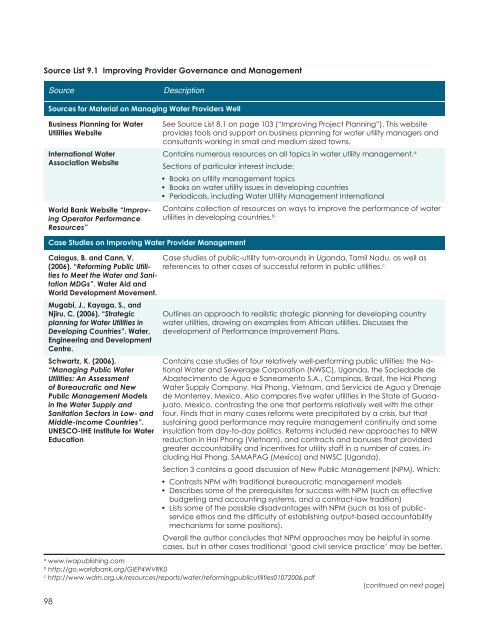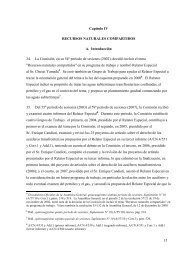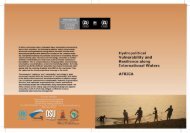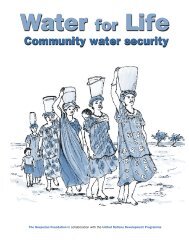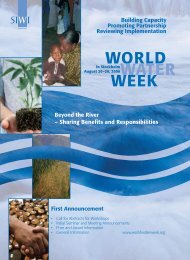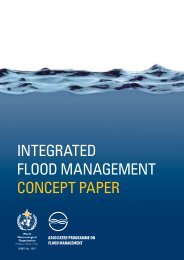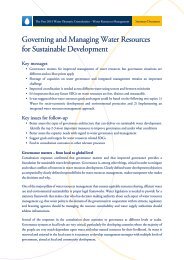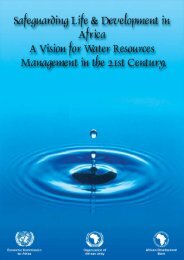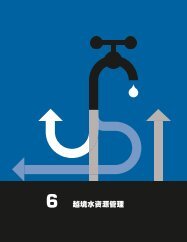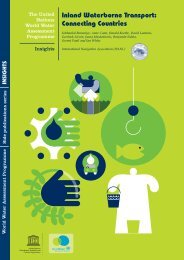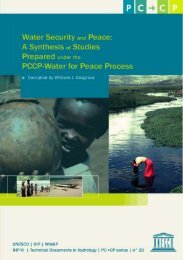A Sourcebook - UN-Water
A Sourcebook - UN-Water
A Sourcebook - UN-Water
Create successful ePaper yourself
Turn your PDF publications into a flip-book with our unique Google optimized e-Paper software.
Source List 9.1 Improving Provider Governance and Management<br />
Source<br />
Description<br />
Sources for Material on Managing <strong>Water</strong> Providers Well<br />
Business Planning for <strong>Water</strong><br />
Utilities Website<br />
International <strong>Water</strong><br />
Association Website<br />
World Bank Website “Improving<br />
Operator Performance<br />
Resources”<br />
See Source List 8.1 on page 103 (“Improving Project Planning”). This website<br />
provides tools and support on business planning for water utility managers and<br />
consultants working in small and medium sized towns.<br />
Contains numerous resources on all topics in water utility management. a<br />
Sections of particular interest include:<br />
• Books on utility management topics<br />
• Books on water utility issues in developing countries<br />
• Periodicals, including <strong>Water</strong> Utility Management International<br />
Contains collection of resources on ways to improve the performance of water<br />
utilities in developing countries. b<br />
Case Studies on Improving <strong>Water</strong> Provider Management<br />
Calagus, B. and Cann, V.<br />
(2006). “Reforming Public Utilities<br />
to Meet the <strong>Water</strong> and Sanitation<br />
MDGs”. <strong>Water</strong> Aid and<br />
World Development Movement.<br />
Mugabi, J., Kayaga, S., and<br />
Njiru, C. (2006). “Strategic<br />
planning for <strong>Water</strong> Utilities in<br />
Developing Countries”. <strong>Water</strong>,<br />
Engineering and Development<br />
Centre.<br />
Schwartz, K. (2006).<br />
“Managing Public <strong>Water</strong><br />
Utilities: An Assessment<br />
of Bureaucratic and New<br />
Public Management Models<br />
in the <strong>Water</strong> Supply and<br />
Sanitation Sectors in Low- and<br />
Middle-Income Countries”.<br />
<strong>UN</strong>ESCO-IHE Institute for <strong>Water</strong><br />
Education<br />
Case studies of public-utility turn-arounds in Uganda, Tamil Nadu, as well as<br />
references to other cases of successful reform in public utilities. c<br />
Outlines an approach to realistic strategic planning for developing country<br />
water utilities, drawing on examples from African utilities. Discusses the<br />
development of Performance Improvement Plans.<br />
Contains case studies of four relatively well-performing public utilities: the National<br />
<strong>Water</strong> and Sewerage Corporation (NWSC), Uganda, the Sociedade de<br />
Abastecimento de Água e Saneamento S.A., Campinas, Brazil, the Hai Phong<br />
<strong>Water</strong> Supply Company, Hai Phong, Vietnam, and Servicios de Agua y Drenaje<br />
de Monterrey, Mexico. Also compares five water utilities in the State of Guanajuato,<br />
Mexico, contrasting the one that performs relatively well with the other<br />
four. Finds that in many cases reforms were precipitated by a crisis, but that<br />
sustaining good performance may require management continuity and some<br />
insulation from day-to-day politics. Reforms included new approaches to NRW<br />
reduction in Hai Phong (Vietnam), and contracts and bonuses that provided<br />
greater accountability and incentives for utility staff in a number of cases, including<br />
Hai Phong, SAMAPAG (Mexico) and NWSC (Uganda).<br />
Section 3 contains a good discussion of New Public Management (NPM). Which:<br />
• Contrasts NPM with traditional bureaucratic management models<br />
• Describes some of the prerequisites for success with NPM (such as effective<br />
budgeting and accounting systems, and a contract-law tradition)<br />
• Lists some of the possible disadvantages with NPM (such as loss of publicservice<br />
ethos and the difficulty of establishing output-based accountability<br />
mechanisms for some positions).<br />
Overall the author concludes that NPM approaches may be helpful in some<br />
cases, but in other cases traditional ‘good civil service practice’ may be better.<br />
a<br />
www.iwapublishing.com<br />
b<br />
http://go.worldbank.org/GIEP4WVRK0<br />
c<br />
http://www.wdm.org.uk/resources/reports/water/reformingpublicutilities01072006.pdf<br />
(continued on next page)<br />
98


